This article is about the elections held in 1922 for Pennsylvania's Class 1 Senate seat. For the special election also held that year for Pennsylvania's Class 3 Senate seat, see 1922 United States Senate special election in Pennsylvania.
| |||||||||||||||||||||
 County results Reed: 50–60% 60–70% 70–80% 80–90% Shull: 40–50% 50–60% 60–70% 70–80% | |||||||||||||||||||||
| |||||||||||||||||||||
The 1922 United States Senate elections in Pennsylvania were held on November 7. Incumbent Republican U.S. Senator David A. Reed, who was appointed in August 1922 to fill the vacancy created by the death of William E. Crow, was elected both to complete the remainder of Crow's term, ending in March 1923, and to a full six-year term in his own right, beginning upon the expiration of Crow's term. [1]



